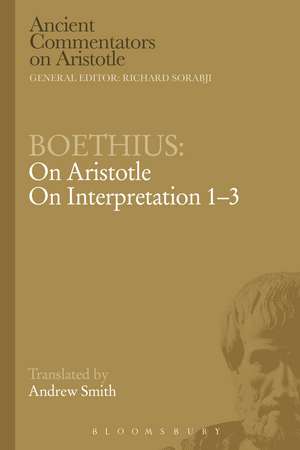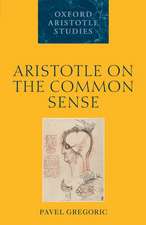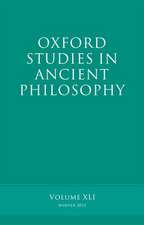Boethius: On Aristotle On Interpretation 1-3: Ancient Commentators on Aristotle
Autor Boethius Traducere de Andrew Smithen Limba Engleză Paperback – 10 apr 2014
Boethius discusses individuality and ascribes to Aristotle a view that each individual is distinguished by having a composite quality that is not merely unshared, but unshareable. Boethius also discusses why we can still say that the dead Homer is a poet, despite having forbidden us to say that the dead Socrates is either sick or well. But Boethius' most famous contribution is his interpretation of Aristotle's discussion of the threat of that tomorrow's events, for example a sea battle, will have been irrevocable 10,000 years ago, if it was true 10,000 years ago that there would be a sea battle on that day. In Boethius' later Consolation of Philosophy, written in prison awaiting execution, he offered a seminal conception of eternity to solve the related problem of future events being irrevocable because of God's foreknowledge of them.
Boethius' influential commentary was part of his ideal of bringing Plato and Aristotle to the Latin-speaking world. Throughout the Latin Middle Ages, it remained the standard introduction to On Interpretation.
This volume contains the first English translation of Boethius' commentary, as well as a detailed introduction, notes and bibliography.
| Toate formatele și edițiile | Preț | Express |
|---|---|---|
| Paperback (1) | 262.81 lei 6-8 săpt. | |
| Bloomsbury Publishing – 10 apr 2014 | 262.81 lei 6-8 săpt. | |
| Hardback (1) | 974.32 lei 6-8 săpt. | |
| Bloomsbury Publishing – 22 iul 2010 | 974.32 lei 6-8 săpt. |
Din seria Ancient Commentators on Aristotle
- nou
 Preț: 528.06 lei
Preț: 528.06 lei - 16%
 Preț: 270.76 lei
Preț: 270.76 lei - 17%
 Preț: 264.99 lei
Preț: 264.99 lei - 39%
 Preț: 734.25 lei
Preț: 734.25 lei - 17%
 Preț: 264.12 lei
Preț: 264.12 lei - 26%
 Preț: 734.59 lei
Preț: 734.59 lei - 18%
 Preț: 261.24 lei
Preț: 261.24 lei - 26%
 Preț: 735.08 lei
Preț: 735.08 lei - 39%
 Preț: 734.24 lei
Preț: 734.24 lei - 26%
 Preț: 730.70 lei
Preț: 730.70 lei - 17%
 Preț: 264.50 lei
Preț: 264.50 lei - 17%
 Preț: 264.31 lei
Preț: 264.31 lei - 21%
 Preț: 733.50 lei
Preț: 733.50 lei - 17%
 Preț: 264.09 lei
Preț: 264.09 lei - 17%
 Preț: 264.09 lei
Preț: 264.09 lei - 17%
 Preț: 263.75 lei
Preț: 263.75 lei - 18%
 Preț: 261.96 lei
Preț: 261.96 lei - 17%
 Preț: 266.36 lei
Preț: 266.36 lei - 39%
 Preț: 734.74 lei
Preț: 734.74 lei - 18%
 Preț: 262.34 lei
Preț: 262.34 lei - 21%
 Preț: 735.76 lei
Preț: 735.76 lei - 17%
 Preț: 263.46 lei
Preț: 263.46 lei - 17%
 Preț: 263.19 lei
Preț: 263.19 lei - 18%
 Preț: 261.96 lei
Preț: 261.96 lei - 17%
 Preț: 264.31 lei
Preț: 264.31 lei - 17%
 Preț: 263.19 lei
Preț: 263.19 lei - 21%
 Preț: 734.39 lei
Preț: 734.39 lei - 26%
 Preț: 734.00 lei
Preț: 734.00 lei - 17%
 Preț: 264.31 lei
Preț: 264.31 lei - 21%
 Preț: 735.01 lei
Preț: 735.01 lei - 17%
 Preț: 264.88 lei
Preț: 264.88 lei - 17%
 Preț: 264.31 lei
Preț: 264.31 lei - 26%
 Preț: 263.65 lei
Preț: 263.65 lei - 21%
 Preț: 734.24 lei
Preț: 734.24 lei - 17%
 Preț: 265.91 lei
Preț: 265.91 lei - 17%
 Preț: 265.07 lei
Preț: 265.07 lei - 17%
 Preț: 264.04 lei
Preț: 264.04 lei - 21%
 Preț: 734.23 lei
Preț: 734.23 lei - 39%
 Preț: 734.18 lei
Preț: 734.18 lei - 17%
 Preț: 263.46 lei
Preț: 263.46 lei - 39%
 Preț: 734.66 lei
Preț: 734.66 lei - 30%
 Preț: 974.85 lei
Preț: 974.85 lei
Preț: 262.81 lei
Preț vechi: 318.39 lei
-17%
Puncte Express: 394
Preț estimativ în valută:
46.48€ • 55.00$ • 40.53£
46.48€ • 55.00$ • 40.53£
Carte tipărită la comandă
Livrare economică 03-17 aprilie
Specificații
ISBN-13: 9781472557896
ISBN-10: 1472557891
Pagini: 176
Dimensiuni: 156 x 234 x 10 mm
Greutate: 0.26 kg
Editura: Bloomsbury Publishing
Colecția Bloomsbury Academic
Seria Ancient Commentators on Aristotle
Locul publicării:London, United Kingdom
ISBN-10: 1472557891
Pagini: 176
Dimensiuni: 156 x 234 x 10 mm
Greutate: 0.26 kg
Editura: Bloomsbury Publishing
Colecția Bloomsbury Academic
Seria Ancient Commentators on Aristotle
Locul publicării:London, United Kingdom
Cuprins
Conventions
Textual Emendations
Introduction
Translator's Note
Translation
Book 1
Book 2
Book 3
Notes
Select Bibliography
English-Latin Glossary
Latin-English Index
Index of Names
Subject Index
Textual Emendations
Introduction
Translator's Note
Translation
Book 1
Book 2
Book 3
Notes
Select Bibliography
English-Latin Glossary
Latin-English Index
Index of Names
Subject Index













